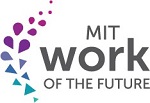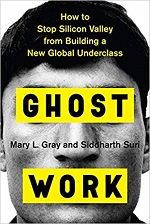 |
|
Industry Studies Association
2020 Virtual Conference Program
Thursday, June 4 and Friday, June 5
11:00am - 2:30pm EDT Each Day
Join us for our first ever virtual conference! Plenaries, Meet the Authors, Awards, Policy Panel, Research Presentations, and More!
|
|
Thursday, June 4
11:00am-11:55am
Welcome | John Paul MacDuffie, ISA President
The Work of the Future in the Age of COVID-19: Opening Plenary
|
 |
Discussions about how AI and robotics are changing the nature of work and the implications for workers have taken a backseat to more immediate concerns about mass unemployment, long-term economic hardship and rebuilding economies in the wake of COVID-19. While much is uncertain, it is clear that the future of work will look decidedly different than the past. This panel will address the myriad issues that have arisen due to the crisis - the reshaping of industries including supply chains and what role technology will play going forward, the fate of small and medium-size businesses, different institutional responses regarding labor-adjustment policies, and the implications of more remote work. Drawn from members of MIT’s Work of the Future initiative, the panelists will discuss how our thinking about the work of the future is changed by the crisis as well as what key issues and themes remain the same.
|
David Mindell
Professor, History of Engineering & Manufacturing &
Aero/Astro MIT
Co-Chair, MIT Work of the Future
Founder and CEO, Humatics Corporation
Erik Brynjolfsson
Professor, MIT Sloan School
Director, MIT Initiative on the Digital Economy
Thomas Kochan
Professor, MIT Sloan School
Co-Director, Institute for Work & Employment Research
Co-Director Good Companies, Good Jobs Initiative
Susan Helper
Professor of Economics
Case Western Weatherhead School of Business
MIT Work of the Future Advisory Board
Moderator: Elisabeth B. Reynolds
Principal Research Scientist & Lecturer
MIT Dept. of Urban Studies and Planning
Executive Director, MIT Industrial Performance &
Work of the Future
|
|
Thursday, June 4
12:00-12:25pm
ISA Awards Ceremony | Tonya Boone, ISA Board Member
ISA Dissertation Award
ISA Rising Star Award
Entrepreneurship and Innovation "Best Paper" Award
Entrepreneurship and Innovation "Young Scholar" Award
Ralph Gomory "Best Industry Studies Paper" Award
|
12:30-1:25pm
Special Feature I
|
 |
Globalization, Norms, and Integrity: The Case of Pharmaceuticals
Katherine Eban, Author of Bottle of Lies
Richard Saynor, CEO of Sandoz
Moderator: John Gray, Ohio State University
Katherine Eban will discuss her 2019 New York Times Best Seller, Bottle of Lies, in which she describes the fraudulent activities of many manufacturers of generic medicines. Richard Saynor will bring an executive’s perspective on the behaviors uncovered. They together will discuss the path to better and more consistent global norms in the global manufacturing of drugs. They will then discuss how COVID-19 has affected progress towards this as, for example the FDA has halted foreign inspections of manufacturing plants and allowed shipments of drugs from plants previously prohibited from doing so.
|


|
1:30-2:25pm
Special Feature II
|
 |
Ghost Work: How to Stop Silicon Valley from Building a New Global Underclass
Mary L. Gray, Author
Panelist: Lindsey Cameron, University of Pennsylvania
Moderator: Jerry Jacobs, University of Pennsylvania
In the age of the gig economy and fissured work, the emergence of new artificial intelligence (AI) technologies have created “ghost work.” Authors Mary L. Gray and Siddharth Suri of Microsoft Research coin the term to describe the invisible labor that supports technology platforms reliant on AI. From labeling images to classification tasks to cleaning up databases, contract workers at all skill levels are engaging in project-based, task-driven work to make unstructured data structured. Gray, along with panelists, will discuss the likely trajectory for this type of work given the increasing use of AI, the implications for workers and their work conditions, and potential policy responses that could “stop making our lives wrap around work, and start making work serve our lives.” Together, they will also address the complexities of working with physical and social distances that are reshaping our lives, from the demand for telehealth contact tracers to the rapid rise in platform-mediated jobs during the pandemic even as workers in other settings face wholesale layoffs.
|
 |
|
Friday, June 5
11:00am-11:55am
Welcome | John Paul MacDuffie, ISA President
Challenges and Opportunities Arising from COVID-19: Industry Studies Perspectives
|
 |
Panelists
Rena Conti, Boston University (Pharmaceuticals)
Erica Fuchs, Carnegie-Mellon University (Globalization)
Benn Lawson, Cambridge University (Operations and Supply Chains)
Adam Seth Litwin, Cornell University (Health Care)
Moderator: John Paul MacDuffie, University of Pennsylvania (Manufacturing)
Industry studies scholars bring a unique perspective to understanding the impact of COVID-19, given our deep immersion in the industry context, focus on phenomena-centered questions, and multi-disciplinary, multi-method research approaches. In this panel, we will cover, briefly, multiple industries to explore how they have been affected, both domestically and globally, by the COVID-19 pandemic – as well as presenting cross-industry perspectives on central challenges of globalization and supply chain risk management.
|
|
12:00-12:55pm
Policy Panel
|
|
Does America Need an Industrial Policy and Strategy?
The Perspective of Senator Charles Schumer, Senate Minority Leader
Presented by: Jon Cardinal, Director of Economic Development, Office of the Senate Minority Leader
The Perspective of Senator Marco Rubio, Chair, Senate Committee on Small Business and Entrepreneurship (SBC)
Presented by: Chris Griswold, Senior Adviser for Industry & Innovation, Senate SBC
In 2019, the substantial restructuring of the U.S. economic landscape propelled by two decades of intense global competition had led leaders in both political parties to call for the development of a more deliberate and strategic federal industrial policy. In the 2020 pandemic, breaks in global supply chains for medical supplies and pharmaceuticals have only intensified interest in industrial policy. This session brings together representatives of two Senate proponents of industrial policy and one of the nation's foremost scholars on the subject.
Presenter and Discussant Reference Materials
Jon Cardinal (for Senator Schumer) -- Endless Frontier Act summary and text
Chris Griswold (for Senator Rubio)
|
|
|
1:00-2:30pm
ISA Research
|
|
Sessions organized by Research Stream (number & format to be announced) drawing on authors and papers originally submitted for the 2020 Conference, reconfigured for the virtual conference
Research Streams (Chair):
Energy, Power, and Sustainability (Adam Fremeth, University of Western Ontario)
Globalization (Hiram Samel, MIT)
Health Care (Tina Wu, New York University)
Entrepreneurship and Innovation (Mahka Moeen, University of North Carolina)
Labor Markets, Organizations, & Employment Relations (Ariel Avgar, Cornell University)
Operations and Supply Networks (Benn Lawson, University of Cambridge (UK))
Technology Management (Raja Roy, New Jersey Institute of Technology)
General Industry Studies (Ingrid Nembhard, University of Pennsylvania)
Research Sessions
1:00-1:45pm Sessions
Research Stream: Energy, Power, & Sustainability
Panel Title: Accelerating plug-in electric vehicle adoption and achieving climate goals
Chair: John Paul Helveston, The George Washington University ([email protected])
Description: Reducing carbon emissions from the U.S. transportation sector is crucial to achieving international climate goals. Efforts by policymakers and car manufacturers towards this goal have focused on increasing the adoption of plug-in electric vehicles (PEVs). This panel includes five papers unpacking multiple factors associated with this goal, including the impacts of PEV incentive policies, individual driver behavior, and vehicle fleet turnover rates on emissions reduction potential as well as the links between consumer knowledge and experience with PEVs and PEV adoption.
Papers:
- "Accelerating Vehicle Fleet Turnover to Achieve Climate Policy Goals", by Sergey Naumov (MIT), David Keith (MIT), and John Sterman (MIT)
- "Electric vehicle adoption: can short experiences lead to big change?", by Laura Roberson (The George Washington University) and John Paul Helveston (The George Washington University)
- "Real-World Patterns of Hybrid and Electric Vehicle Driving in the United States", by David Keith, (MIT) Sapna Kumari, (MIT) Steven R. Gehrke, (Northern Arizona University), and Tim Reardon (Massachusetts Area Planning Council)
- "Alternative-fuel-vehicle policy interactions increase U.S. greenhouse gas emissions", by Alan Jenn, (UC Davis), Inês L. Azevedo, (CMU), and Jeremy J.Michalek (CMU)
- "The dynamic costs and benefits of a technology-forcing policy nested in a broader performance standard: the case of ZEV and CAFE", by Arthur H.C. Yip, (CMU), Jeremy J. Michalek, (CMU), and Kate S. Whitefoot (CMU)
Research Stream: Globalization: Management & Policy Implications
Panel Title: National and institutional divergence in a post-global world? Trade War? Limited FDI? Provenance Labeling? New division of labor? What global shifts will be accelerated by COVID-19?
Chair: Hiram Samel (Massachusetts Institute of Technology)
Papers:
- "Trade War Politics and Policy: Mapping Supply-Chain Vulnerabilities in the Mobile Telecommunications Industry", by Eric Thun* (Oxford University) and Timothy Sturgeon (Massachusetts Institute of Technology)
- "Business Networks and Enclave Formation: Why Foreign Investment Fails to Transfer Technology", by Michael Murphree (University of South Carolina)
- It is often assumed that foreign direct investment results in knowledge and technology transfer to both host country workers and firms. We show, however, that the enclave effect prevents much of this spillover as skills remain isolated within the community of foreign-invested enterprises, sometimes supplanting even already extant local firms
- "The New Institutional Economics Approach and Understanding Geographical Indication Supply Chains", by Pelin Bicen (Suffolk University)
- The purpose of this study is to discuss the concept of Geographical Indications (GI) and how the hybrid governance structure of GI supply chain networks form. The theoretical foundation for the explanations comes from the New Institutional Economics (NIE) framework. Study also illustrates how the GI supply chains are formed and governed by using a notable GI case study from Turkey.
- "Work of the Future—The Case of Brazil", by Timothy Sturgeon* (Massachusetts Institute of Technology), Alejandro Frank (Organizational Engineering Group (NEO)), Nestor Alaya (Organizational Engineering Group (NEO)), and Erico Marcon, PhD Candidate (Organizational Engineering Group (NEO))
Research Stream: Labor Markets, Organizations, & Employment Relations
Panel Title: Work of the Future in Eds and Meds
Chair: Francoise Carré (University of Massachusetts Boston)
Description: This panel examines key future of work themes in two central industries—healthcare and education. In particular, presentations will focus on the affects that new technologies are having on frontline workers and their jobs. In doing so, the session will provide a unique comparison of the similarities and differences associated with the introduction of new technologies across these industries, with implications for organizational practices and broader public policies. Panelists will address the implications that COVID-19 has had on the link between technology and work in healthcare and education.
Papers:
- "The Future of Work in Healthcare", by Linda Rhodes (Public Works)
- "In Search of an Inclusive Model for the AI Economy", by Denise Dowell (Keystone Research Center) and Stephen Herzenberg (Keystone Research Center)
- "Technological Change in Healthcare Delivery", by Adam Seth Litwin (Cornell University)
1:45-2:30pm Sessions
Research Stream: Healthcare
Panel Title: Insights from Healthcare Industry Research for a Post COVID-19 World
Chair: Tina Wu (NYU Stern)
Description: How do recent research in healthcare inform possible paths forward in a world after COVID-19? This panel provides a range of insights from research on pharmaceutical innovation, healthcare professions and collaboration, and technology and the future of healthcare work. Collectively, these papers draw on knowledge about developments in healthcare that existed before the recent global pandemic that have become increasingly timely and critical.
Papers:
- "Global Drug Diffusion and Innovation with a Patent Pool: The Case of HIV Drug Cocktails", by Lucy Xiaolu Wang (Cornell University)
- "When Innovative Practices Impact on Professions: New forms of Collaborations Between Nurses and Physicians", by Paola Roberta Boscolo (Bocconi University) and James Barlow (Imperial College Business School)
- "AI in Collaborative Groups", by Vincent Rice (Brown University), Chester Spell (The State University of New Jersey), Terri Griffith (Simon Fraser University), Katerina Bezrukova (University at Buffalo), and Evangeline Yang (University at Buffalo)
- "The Future of Work for Health Informatics and Information Management Professionals", by Susan Fenton (UT School of Biomedical Informatics) and Karima H. Lalani (Texas State University)
Research Stream: Labor Markets, Organizations, & Employment Relations
Panel Title: Improving the Future of Work for Low-Wage Workers: Perspective from Multiple Industries
Chair: Paul Osterman (MIT) Barbara Dyer (MIT)
Description: For all the concern about new developments affecting work—technology advances, “Uberization,” contracting, and so on—one thing that is constant and has been true for decades is the persistence of a large low-wage job market that nearly a quarter of working U.S. adults are trapped in. Yet within the low-wage job market, conditions vary widely by industry, as do the potential remedies for improving job quality. This panel will include research on industry-specific approaches to improving job quality in several industries that employ many low-wage workers in the U.S. The panelists will be drawn from the authors of chapters in the new book “Creating Good Jobs: An Industry-Based Strategy,” edited by Paul Osterman and forthcoming from MIT Press.
Papers:
- "The Trouble With Trucking: How Low-Road Strategies Work in the Transportation Industry", by Steve Viscelli* (University of Pennsylvania)
- "The Quality of Jobs in Restaurants", by Rosemary Batt* (Cornell University), Tashlin Lakhani (Ohio State), Jae Eun Lee (Ithaca College), and Can Ouyang (Cornell University)
- "Residential Construction", by Dale Belman* (Michigan State), Russell Ormiston (Allegheny College), Julie Brockman (Michigan State), and Matt Hinkel (Michigan State)
- "Retail Jobs: What Pathways for Improvement?", by Francoise Carré* (University of Massachusetts Boston), and Chris Tilly (University of California, Los Angeles)
Research Stream: Operations & Supply Networks
Panel Title: Managing operations and supply chains: Perspectives on knowledge, productivity, and network relationships
Chair: Benn Lawson (University of Cambridge)
Description: The panel draws on work conducted across multiple industries to provide insight on managing complex operations and supply chains. The five papers examine different aspects, including managing knowledge in medical-device manufacturing, productivity and sustainability in agriculture, supply network design in retail, and the evolution of supply chain relationships within complex projects and in response to disruptions.
Papers:
- “Organizational Inefficiencies: A Knowledge-Based Examination in Medical Device Manufacturing” by Jeffrey Macher (Georgetown)
- “Farmers, Productivity and the Environment: A Study of Large-Scale Industrial Agriculture in the U.S. Midwest” by Canberk Ucel* (Wharton), John Paul Macduffie (Wharton), and Marshall Fisher (Wharton)
- “Shopping Activity at Warehouse Club Stores and its Competitive and Network-density Implications” by Stanley Lim (USD)
- “Configuring Supply Chain Dyads for Regulatory Disruptions: A Behavioral Study of Scenarios” by Shardul Phadnis* (Malaysia Institute for Supply Chain Innovation, MIT) and Nitin Joglekar (Boston University)
- “Interpartner Legitimacy Building During the Formation of a Multiparty Alliance” by Renate Taubeneder* (Bath U.), Jens Roehrich (Bath U), and Brian Squire (Bath U)
*denotes presenter of a multi-authored paper
|
|